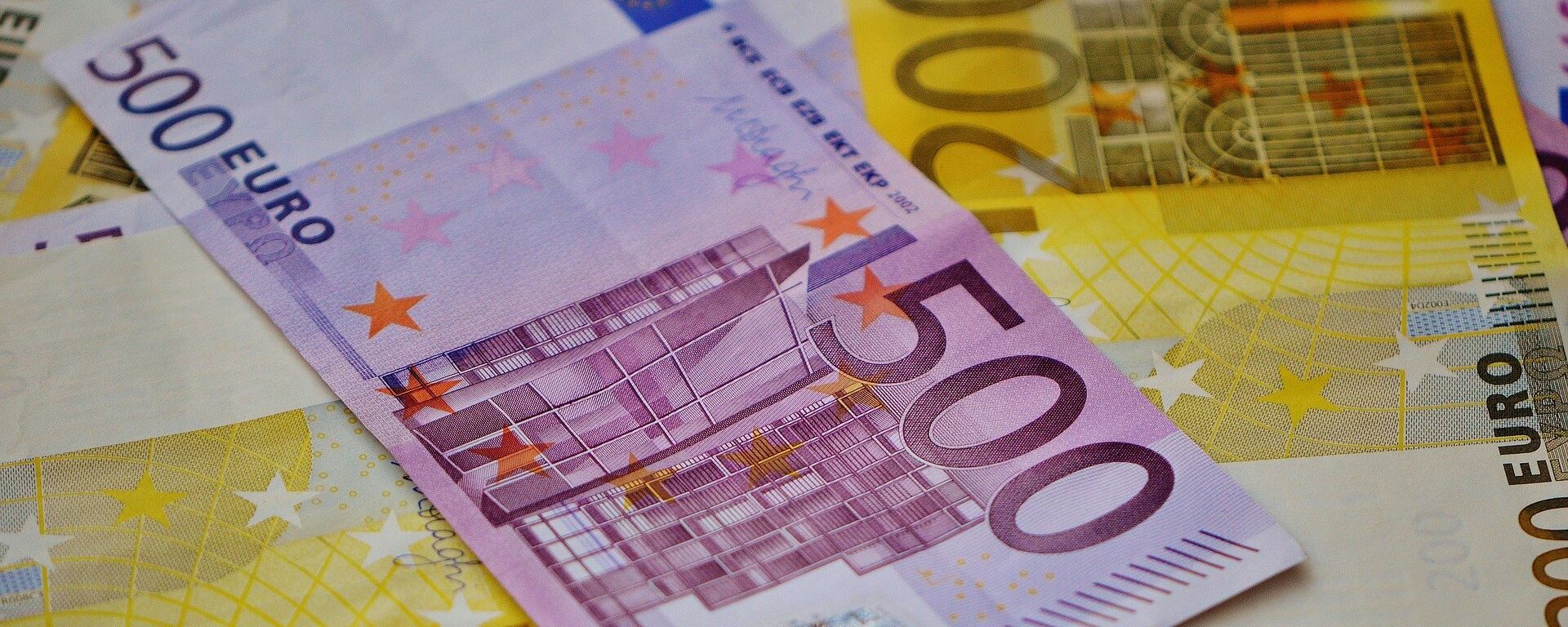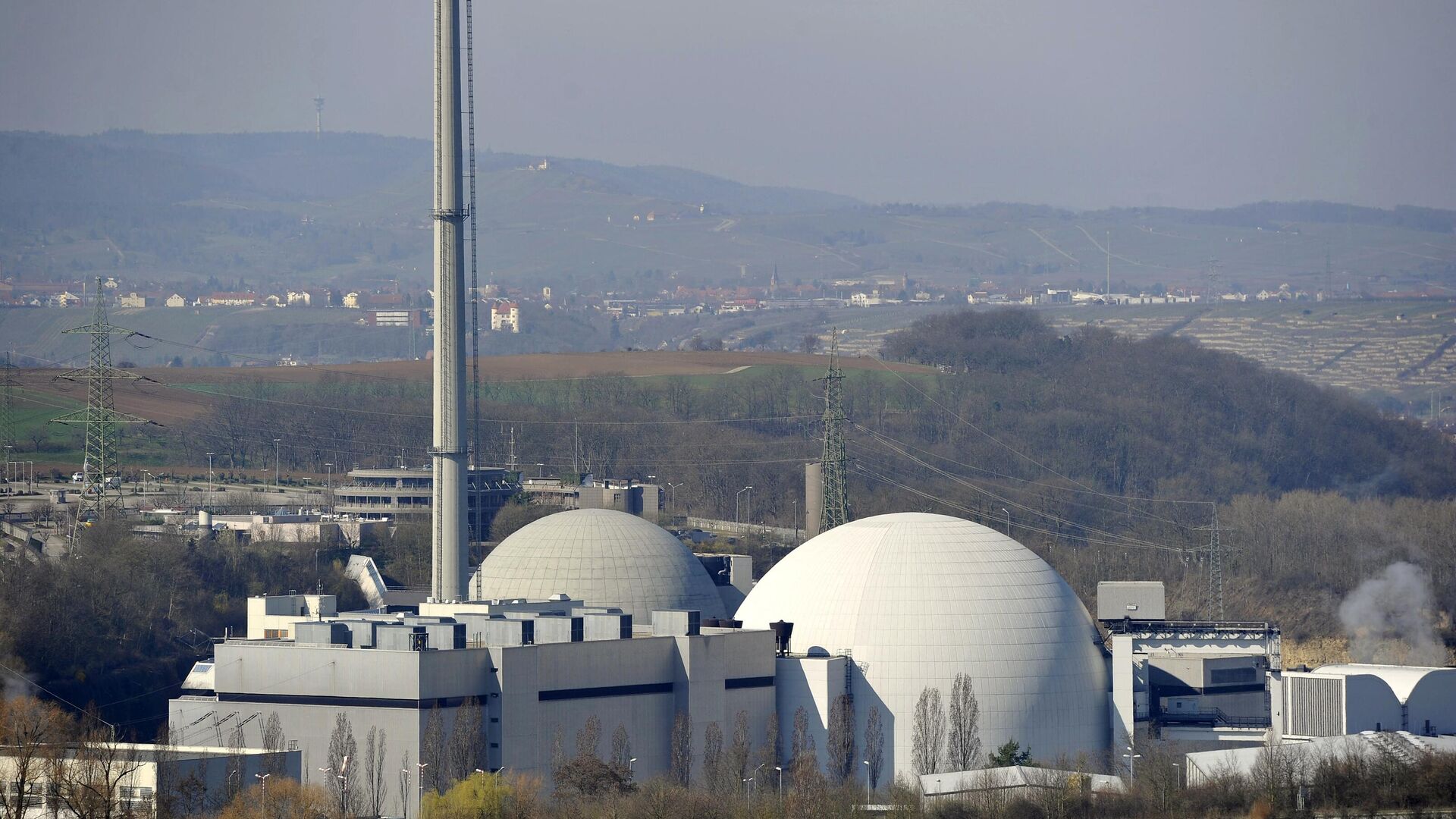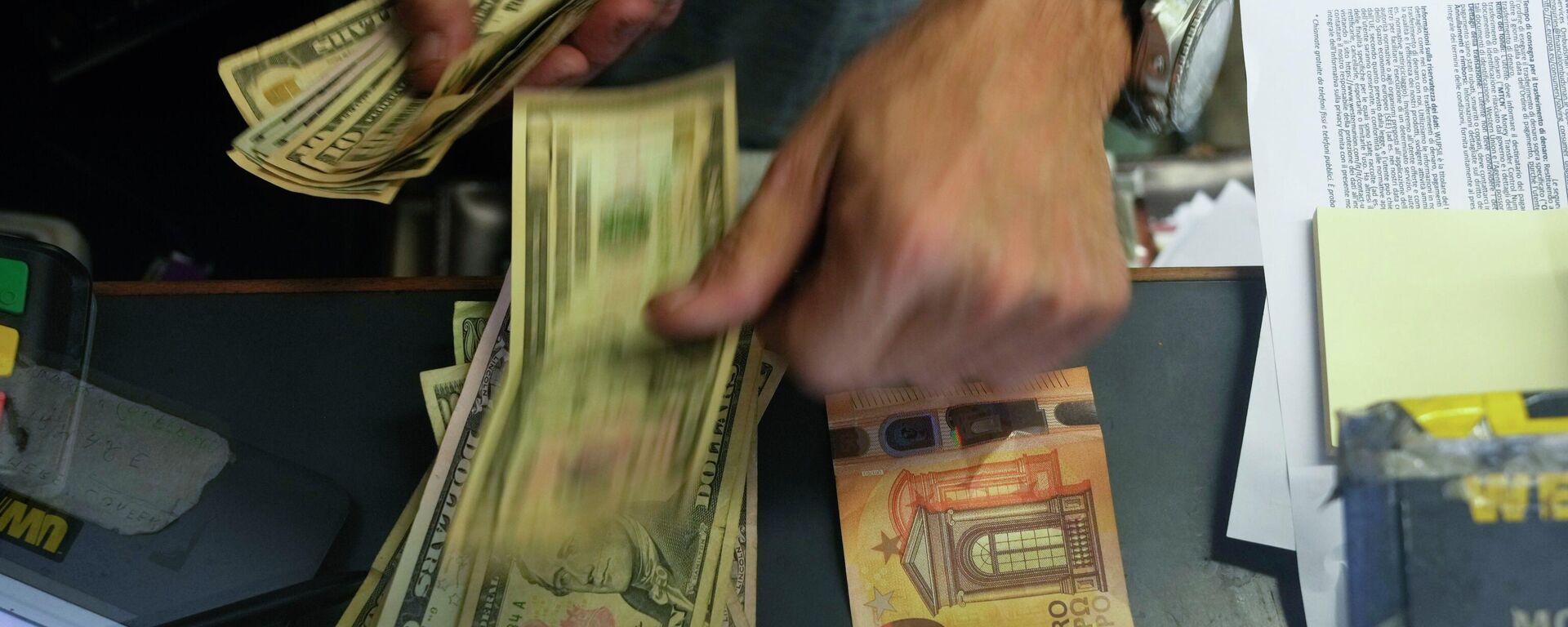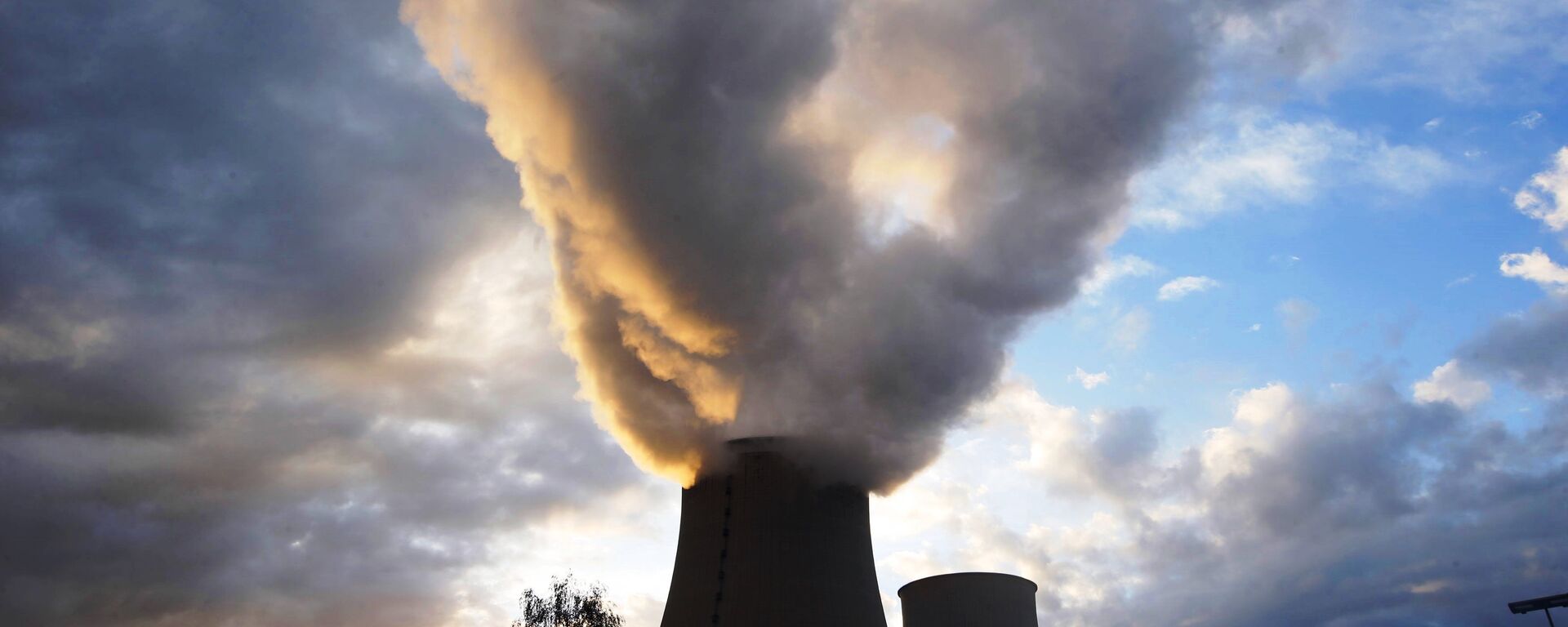https://sputnikglobe.com/20230918/france-and-germany-clash-over-nuclear-power-role-in-eus-green-agenda-1113451673.html
France and Germany Clash Over Nuclear Power Role in EU's Green Agenda
France and Germany Clash Over Nuclear Power Role in EU's Green Agenda
Sputnik International
France and Germany face a critical impasse over nuclear energy's role in the EU's green agenda, intensifying tensions in the bloc. As both nations stand firm, the discord threatens Europe's industrial core and raises concerns of economic competitiveness amid global shifts in energy dynamics.
2023-09-18T19:03+0000
2023-09-18T19:03+0000
2023-09-18T19:03+0000
economy
olaf scholz
europe
claudia kemfert
emmanuel macron
france
germany
berlin
edf
european parliament
https://cdn1.img.sputnikglobe.com/img/07e7/09/02/1113076629_0:120:3216:1929_1920x0_80_0_0_f94cdba7d707a3b3e47b152cdb0c43a3.jpg
A high-stakes confrontation between France and Germany has revealed a discernible fracture in the cooperative front between the two countries, stemming from an energy dispute.Tensions flared between two economic powerhouses in the European Union as Berlin's last-minute blocking of a deal slated to enforce a prohibition on new sales of fossil fuel-driven cars with internal combustion engines by 2035 incensed France. Berlin requested that Brussels ensure that the impending law allow for the sale of fresh vehicles equipped with combustion engines powered by synthetic fuels - a protectionist move for its automotive industry.This happened as energy pricing continues to be volatile in France in the aftermath of the yellow vest demonstrations (protests by French motorists against fuel price hikes).The dispute over energy pricing is just one piece of the puzzle within the broader panorama of France and Germany's strained ties. A significant rift emerged this year as France and Germany disagreed on the "Green Deal's" fundamental components (the first being a revamp of the European electricity market, whereas the second addresses methods to nurture a competitive green sector within the European Union).Chancellor Olaf Scholz's governing coalition is feeling the heat as support wanes in Germany after a complex springtime reform focused on transitioning household heating away from hydrocarbon fuels. Opposition parties in both countries are deftly leveraging this issue.“Governments in both Paris and Berlin are looking at how to provide electricity at the lowest cost,” expressed Christian Egenhofer, a senior research fellow at the Center for European Policy Studies (CEPS) in Brussels.In a reciprocal move, Paris has vexed Berlin by advocating for a heightened role for nuclear energy in EU initiatives to bolster the production of environmentally friendly technology within Europe.Aiming for a pivotal role, France is positioning itself to lead the charge in efforts to overhaul power-market regulations within the European Union. The primary strategy is to extend the operational longevity of its aging reactors, which are saddled with financial liabilities. This proposed strategy lays the groundwork for the government to bolster resilience within state-owned Electricite de France SA. Simultaneously, it opens up opportunities to access additional sources of funding aimed at extending the operational lifespan of its reactors.Urgent financial support is imperative for the French utility. EDF has outlined its vision for substantial annual investments totaling about €25 billion. These investments are earmarked to facilitate the operational continuity of 56 nuclear reactors commissioned in the 1980s and 1990s. Additionally, the funds would support constructing new reactors, expanding wind and solar capacity, and upgrading the grid. A formidable obstacle lies in the energy giant's balance sheet, which bears the weight of a substantial €65 billion debt.The focal point of contention centers on a fundamental question: how will nuclear energy factor into the impending energy paradigm of the European bloc? Nevertheless, at its essence, this deliberation ventures into the heartland of Europe's industrial nerve center.A palpable determination has set in despite a marked price moderation compared to the unprecedented highs witnessed last year. France and Germany are unwavering in their will to keep pace, determined not to be relegated as the bloc advances towards its net-zero emissions objective.In the heart of the EU's industrial nucleus, a prolonged conflict would be a grievous setback that the region can scarcely bear. President Joe Biden's Inflation Reduction Act has stirred disquiet regarding the potential investment outflow from the EU back to the United States. Meanwhile, the EU’s recent investigation into Chinese subsidies for its electric vehicle producers underscores a sprouting unease shrouding the competitive pricing threat from the Asian juggernaut.In the wake of last year's disruption of Russian gas supplies due to the ratcheted-up Western sanctions on Moscow and Germany’s recent decommissioning of its nuclear power facilities, Berlin is in the midst of a sweeping overhaul of its energy sector. Yet, the Olaf Scholz-led government is currently thwarting the French initiative instead of concentrating on restoring its own energy grid. Germany is apprehensive that should France implement its proposed regulation, granting the EDF the ability to sell power at unsustainable prices, it might put Germany at a disadvantage in terms of energy costs.“The point of disagreement is that the French energy infrastructure is state property,” German Economy Minister Robert Habeck disclosed at an event in Rostock. His response came swiftly after his French counterpart, Bruno Le Maire, declared in an earlier public forum that nuclear energy is a “red line” for France.Germany is on tenterhooks, dreading the potential departure of energy-intensive corporations seeking more favorable investment climates, and “we will lose this industrial base. My point is not that France has nuclear power plants; my point is that the operator of the nuclear power plants can offer cheap prices below market value,” Habeck noted.Germany's persistent energy costs and growing supply security uncertainties, exacerbated by the country's coal phase-out, have raised alarm bells. In stark contrast, France has emerged as an investment magnet, drawing nearly 50 percent more foreign direct investment projects than its German counterpart in the preceding two years.Germany's business community doubts the nation's audacious energy transition - its venturesome push into hydrogen expansion. The German Chamber of Commerce and Industry's recent survey reveals that nearly a third of manufacturers are actively mulling over the prospect of relocating their production abroad or are already in the process. France, seizing the opportunity, is poised to court these businesses.In the throes of last year's energy crisis, the pinnacle of aluminum manufacturing in Germany, Trimet, was forced to implement production cutbacks. A significant shift in Trimet's fortunes unfolded at its smelter in Saint-Jean-de-Maurienne, located in the southeastern region of France. This change was instigated by EDF's strategic move in June, presenting Trimet's French operations with a groundbreaking 10-year supply contract at rates significantly undercutting prevailing market rates. According to Trimet's Chief Executive Officer Philipp Schluter, the availability of cost-effective nuclear power in France is crucial in facilitating the company's "green transformation."According to Eurostat data, France attracted more FDI, experiencing an increase of 31.98 percent in FDI projects between 2020 and 2022. In contrast, Germany saw a marked dip of -10.54 percent during the same period.In an endeavor to tackle the issue, Habeck has floated the idea of temporarily subsidizing industrial power rates. However, garnering broad support for this initiative has proven challenging. Claudia Kemfert, an energy expert at the German Institute of Economic Research in Berlin, contends that the proposal carries the peril of perpetuating state backing for unproductive producers, potentially impeding the crucial shift towards sustainable energy.“Germany’s ambitions for subsidizing the price of electricity for industry are just as misguided as France’s. Germany and France should agree to massively expand renewable energies very quickly,” said Kemfert.With the expiration of a crucial domestic regulation in 2025, pressure on France is heightening; the national energy giant is compelled to distribute substantial power volumes at a significant discount from present wholesale valuations.A senior advisor within the French government contends that forthcoming regulations, slated for imminent presentation, are on track to align future power costs in France with those observed in Germany. The envisioned outcome foresees a mutual understanding of comparable electricity pricing benchmarks for their industrial sectors.Despite being neighbors, France and Germany find themselves at opposed ends of the energy discourse, making harmonizing their differences impervious to reconciliation. Germany has permanently decommissioned its last operational reactors, concluding a brief extension period. In sharp contrast, France leans heavily on nuclear power, forming the backbone of nearly two-thirds of its electricity supply. However, the infrastructure needs modernization, and a series of disruptions — which sent French electricity rates soaring to unprecedented heights last year — emphasized the pressing need for action.While France and Germany remain embroiled in their differences, the window of opportunity to broker an agreement is narrowing. Should this spat linger beyond the close of this year, the impending European Parliament elections next year could impede progress for an extended period. Meanwhile, rival industrial nations are not idly waiting.“The dispute between both countries is not good for Europe,” said Henrik Ahlers, head of consultancy EY in Germany. The EU “should rather be unified with regard to the competition with China and the USA,” he added.
https://sputnikglobe.com/20230308/europes-energy-crisis-not-over-may-get-worse-says-energy-investment-banker-1108162909.html
https://sputnikglobe.com/20160307/edf-uk-nuclear-hinkley-1035903814.html
https://sputnikglobe.com/20230213/european-countries-racked-up-nearly-800-bln-energy-crisis-spending-bill-brussels-think-tank-says-1107376695.html
france
germany
berlin
Sputnik International
feedback@sputniknews.com
+74956456601
MIA „Rossiya Segodnya“
2023
Chimauchem Nwosu
https://cdn1.img.sputnikglobe.com/img/07e7/09/01/1113046371_0:99:1536:1635_100x100_80_0_0_9c5c627283eca931c39fe4852bbb301c.jpg
Chimauchem Nwosu
https://cdn1.img.sputnikglobe.com/img/07e7/09/01/1113046371_0:99:1536:1635_100x100_80_0_0_9c5c627283eca931c39fe4852bbb301c.jpg
News
en_EN
Sputnik International
feedback@sputniknews.com
+74956456601
MIA „Rossiya Segodnya“
Sputnik International
feedback@sputniknews.com
+74956456601
MIA „Rossiya Segodnya“
Chimauchem Nwosu
https://cdn1.img.sputnikglobe.com/img/07e7/09/01/1113046371_0:99:1536:1635_100x100_80_0_0_9c5c627283eca931c39fe4852bbb301c.jpg
france, germany, eu, nuclear energy, green agenda, energy pricing, industrial core, european union, energy transition, net-zero emissions, electricity, renewable energy, nuclear reactors, energy sector, energy crisis, industrial competitiveness, european parliament elections, global energy dynamics, emmanuel macron, olaf scholz, christian egenhofer, centre for european policy studies, ceps, bruno le maire, robert habeck, electricite de france sa, edf, joe biden, chinese electric vehicle producers, german chamber of commerce and industry, trimet, philipp schlüter, kristian ruby, eurelectric, claudia kemfert, german institute of economic research, henrik ahlers, ernst & young.
france, germany, eu, nuclear energy, green agenda, energy pricing, industrial core, european union, energy transition, net-zero emissions, electricity, renewable energy, nuclear reactors, energy sector, energy crisis, industrial competitiveness, european parliament elections, global energy dynamics, emmanuel macron, olaf scholz, christian egenhofer, centre for european policy studies, ceps, bruno le maire, robert habeck, electricite de france sa, edf, joe biden, chinese electric vehicle producers, german chamber of commerce and industry, trimet, philipp schlüter, kristian ruby, eurelectric, claudia kemfert, german institute of economic research, henrik ahlers, ernst & young.
A high-stakes confrontation between France and Germany has revealed a discernible fracture in the cooperative front between the two countries, stemming from an energy dispute.
Tensions flared between two economic powerhouses in the European Union as Berlin's last-minute blocking of a deal slated to enforce a prohibition on new sales of fossil fuel-driven cars with internal combustion engines by 2035 incensed France. Berlin requested that Brussels ensure that the impending law allow for the sale of fresh vehicles equipped with combustion engines powered by synthetic fuels - a protectionist move for its automotive industry.
This happened as energy pricing continues to be volatile in France in the aftermath of the
yellow vest demonstrations (protests by French motorists against fuel price hikes).
The dispute over energy pricing is just one piece of the puzzle within the broader panorama of France and Germany's strained ties. A significant rift emerged this year as France and Germany disagreed on the "
Green Deal's" fundamental components (the first being a revamp of the European electricity market, whereas the second addresses methods to nurture a competitive green sector within the European Union).
Chancellor Olaf Scholz's governing coalition is feeling the heat as
support wanes in Germany after a complex springtime reform focused on transitioning household heating away from hydrocarbon fuels. Opposition parties in both countries are deftly leveraging this issue.
“Governments in both Paris and Berlin are looking at how to provide electricity at the lowest cost,” expressed Christian Egenhofer, a senior research fellow at the Center for European Policy Studies (CEPS) in Brussels.
In a reciprocal move, Paris has vexed Berlin by advocating for a heightened role for nuclear energy in EU initiatives to bolster the production of environmentally friendly technology within Europe.
Aiming for a pivotal role, France is positioning itself to lead the charge in efforts to overhaul power-market regulations within the European Union. The primary strategy is to extend the operational longevity of its aging reactors, which are saddled with financial liabilities. This proposed strategy lays the groundwork for the government to bolster resilience within state-owned Electricite de France SA. Simultaneously, it opens up opportunities to access additional sources of funding aimed at extending the operational lifespan of its reactors.
Urgent financial support is imperative for the French utility. EDF has outlined its vision for substantial annual investments totaling about €25 billion. These investments are earmarked to facilitate the operational continuity of 56 nuclear reactors commissioned in the 1980s and 1990s. Additionally, the funds would support constructing new reactors, expanding wind and solar capacity, and upgrading the grid. A formidable obstacle lies in the energy giant's balance sheet, which bears the weight of a substantial €65 billion debt.
The focal point of contention centers on a fundamental question: how will nuclear energy factor into the impending energy paradigm of the European bloc? Nevertheless, at its essence, this deliberation ventures into the heartland of Europe's industrial nerve center.
A palpable determination has set in despite a marked price moderation compared to the unprecedented highs witnessed last year. France and Germany are unwavering in their will to keep pace, determined not to be relegated as the bloc advances towards its net-zero emissions objective.
In the heart of the EU's industrial nucleus, a prolonged conflict would be a grievous setback that the region can scarcely bear. President Joe Biden's
Inflation Reduction Act has stirred disquiet regarding the potential investment outflow from the EU back to the United States. Meanwhile, the EU’s recent investigation into Chinese subsidies for its electric vehicle producers underscores a sprouting unease shrouding the competitive pricing threat from the Asian juggernaut.
In the wake of last year's disruption of Russian gas supplies due to the ratcheted-up Western sanctions on Moscow and Germany’s recent decommissioning of its nuclear power facilities, Berlin is in the midst of a sweeping overhaul of its energy sector. Yet, the Olaf Scholz-led government is currently thwarting the French initiative instead of concentrating on restoring its own energy grid. Germany is apprehensive that should France implement its proposed regulation, granting the EDF the ability to sell power at unsustainable prices, it might put Germany at a disadvantage in terms of energy costs.
“The point of disagreement is that the French energy infrastructure is state property,” German Economy Minister Robert Habeck disclosed at an event in Rostock. His response came swiftly after his French counterpart, Bruno Le Maire, declared in an earlier public forum that nuclear energy is a “red line” for France.
Germany is on tenterhooks, dreading the potential departure of energy-intensive corporations seeking more favorable investment climates, and “we will lose this industrial base. My point is not that France has nuclear power plants; my point is that the operator of the nuclear power plants can offer cheap prices below market value,” Habeck noted.
Germany's persistent energy costs and growing supply security uncertainties, exacerbated by the country's coal phase-out, have raised alarm bells. In stark contrast, France has emerged as an investment magnet, drawing nearly 50 percent more foreign direct investment projects than its German counterpart in the preceding two years.
Germany's business community doubts the nation's audacious energy transition - its venturesome push into hydrogen expansion. The German Chamber of Commerce and Industry's recent survey reveals that nearly a third of manufacturers are actively mulling over the prospect of relocating their production abroad or are already in the process. France, seizing the opportunity, is poised to court these businesses.
In the throes of last year's energy crisis, the pinnacle of aluminum manufacturing in Germany, Trimet, was forced to implement production cutbacks. A significant shift in Trimet's fortunes unfolded at its smelter in Saint-Jean-de-Maurienne, located in the southeastern region of France. This change was instigated by EDF's strategic move in June, presenting Trimet's French operations with a groundbreaking 10-year supply contract at rates significantly undercutting prevailing market rates. According to Trimet's Chief Executive Officer Philipp Schluter, the availability of cost-effective nuclear power in France is crucial in facilitating the company's "green transformation."
“Industrial competitiveness is an important element in the discussion between Germany and France. Germany is facing the issue that France can have cheaper electricity for many years from nuclear,” said Kristian Ruby, secretary general of the European power-sector association Eurelectric.
According to Eurostat data, France attracted more FDI, experiencing an increase of 31.98 percent in FDI projects between 2020 and 2022. In contrast, Germany saw a marked dip of -10.54 percent during the same period.
In an endeavor to tackle the issue, Habeck has floated the idea of temporarily subsidizing industrial power rates. However, garnering broad support for this initiative has proven challenging. Claudia Kemfert, an energy expert at the German Institute of Economic Research in Berlin, contends that the proposal carries the peril of perpetuating state backing for unproductive producers, potentially impeding the crucial shift towards sustainable energy.
“Germany’s ambitions for subsidizing the price of electricity for industry are just as misguided as France’s. Germany and France should agree to massively expand renewable energies very quickly,” said Kemfert.
With the expiration of a crucial domestic regulation in 2025, pressure on France is heightening; the national energy giant is compelled to distribute substantial power volumes at a significant discount from present wholesale valuations.

13 February 2023, 13:35 GMT
A senior advisor within the French government contends that forthcoming regulations, slated for imminent presentation, are on track to align future power costs in France with those observed in Germany. The envisioned outcome foresees a mutual understanding of comparable electricity pricing benchmarks for their industrial sectors.
Despite being neighbors, France and Germany find themselves at opposed ends of the energy discourse, making harmonizing their differences impervious to reconciliation. Germany has permanently decommissioned its last operational reactors, concluding a brief extension period.
In sharp contrast, France leans heavily on nuclear power, forming the backbone of nearly two-thirds of its electricity supply. However, the infrastructure needs modernization, and a series of disruptions — which sent French electricity rates soaring to unprecedented heights last year — emphasized the pressing need for action.
While France and Germany remain embroiled in their differences, the window of opportunity to broker an agreement is narrowing. Should this spat linger beyond the close of this year, the impending European Parliament elections next year could impede progress for an extended period. Meanwhile, rival industrial nations are not idly waiting.
“The dispute between both countries is not good for Europe,” said Henrik Ahlers, head of consultancy EY in Germany. The EU “should rather be unified with regard to the competition with China and the USA,” he added.






